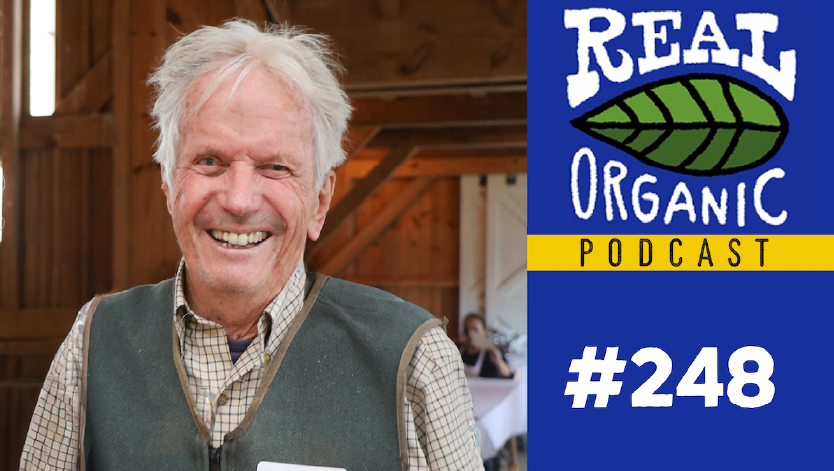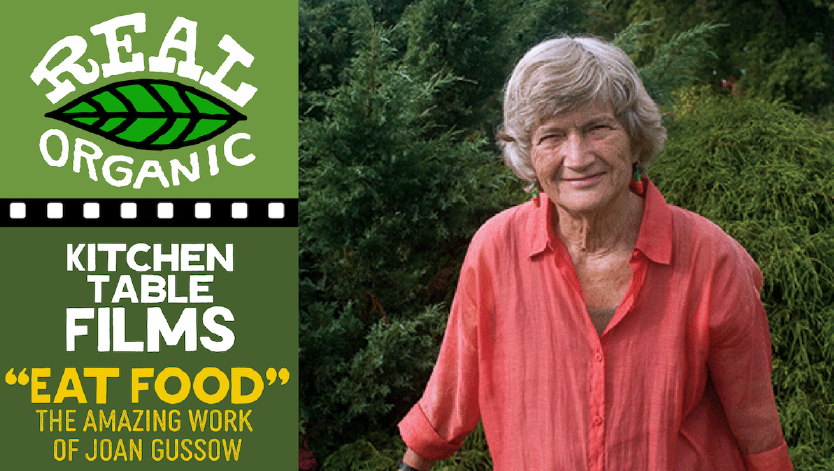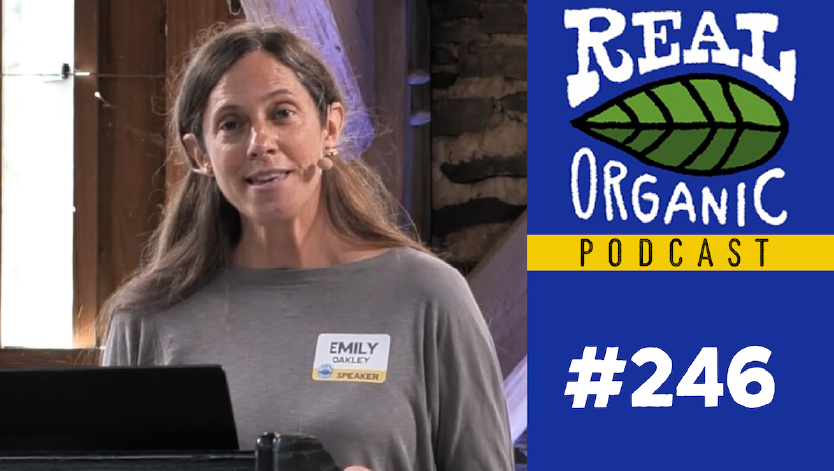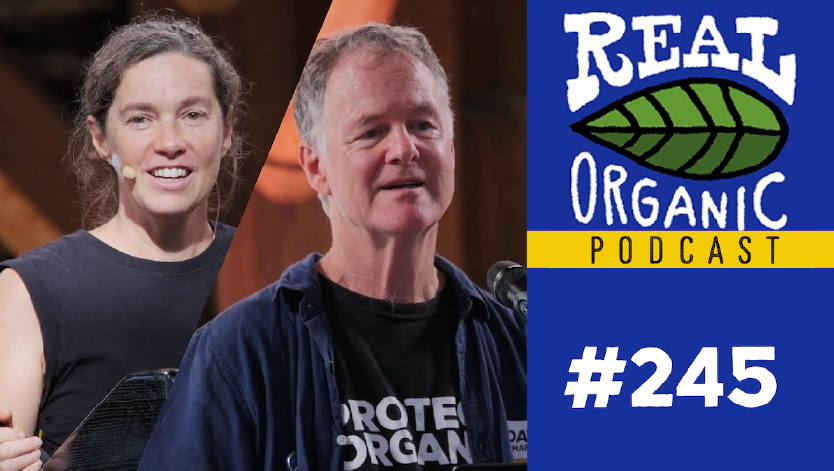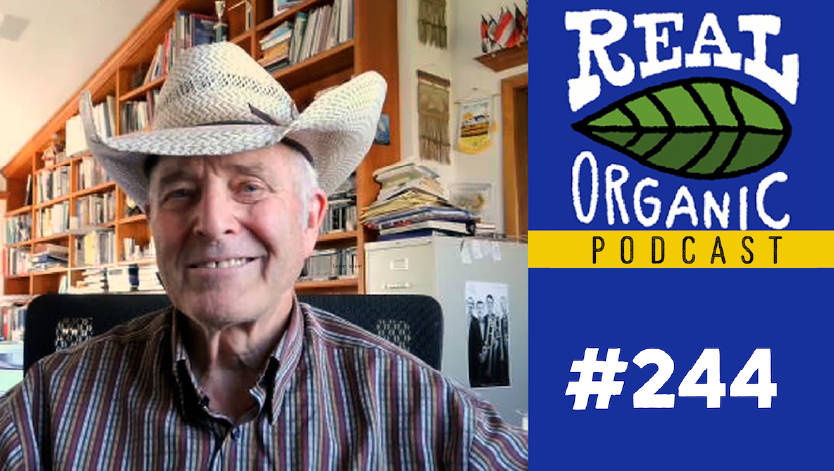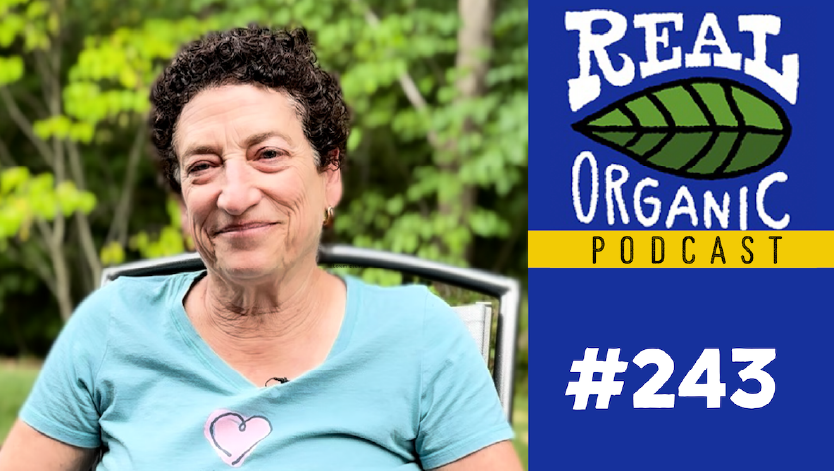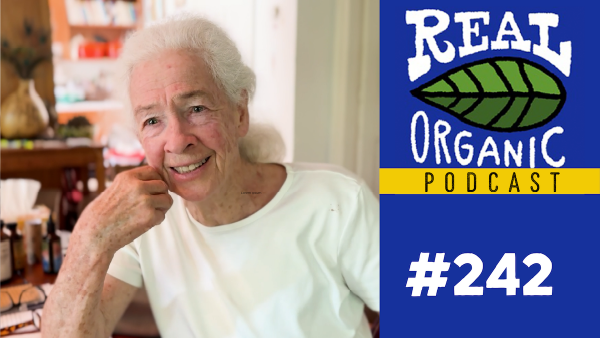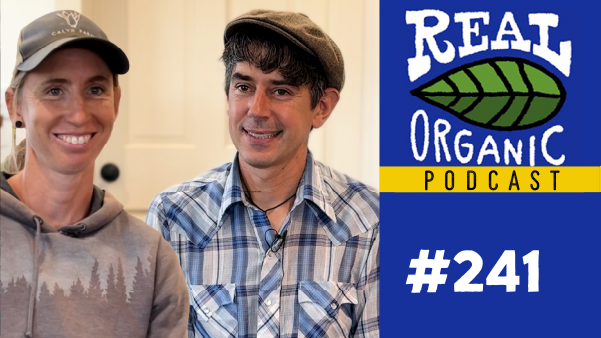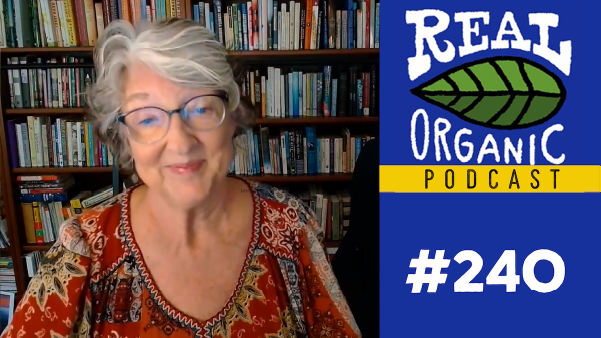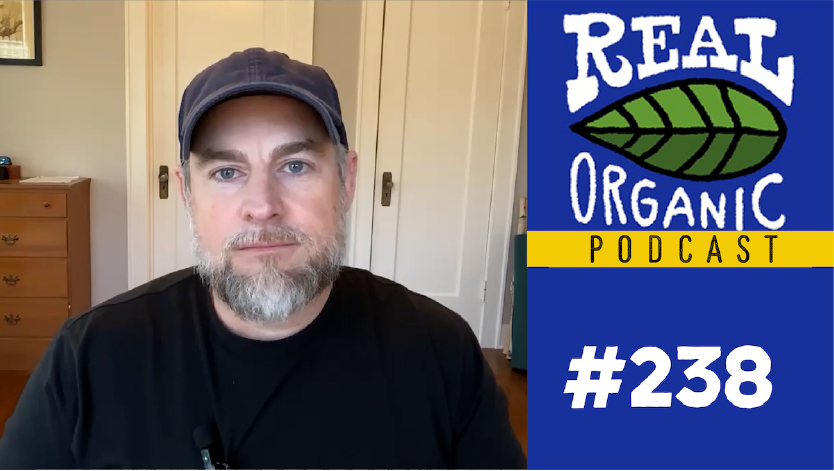Episode #239
Larry Jacobs: Lawsuits + Labeling In USDA Organic
In his third interview with Dave, California farmer Larry Jacobs reflects on decades of work in organic agriculture from co-founding the Del Cabo cooperative to joining a lawsuit that challenged the USDA over its inclusion of hydroponics under the organic label. Larry shares why soil is the foundation of both human and planetary health, how democracy and money shape food policy, and why farmers must keep pushing for integrity in the organic movement.
Our Larry Jacobs interview has been edited and condensed for clarity:
You can subscribe and download episodes of our show through your favorite podcast app, our YouTube channel, or stream the audio-only version here:
Dave Chapman interviews Larry Jacobs in CA, Spring 2025:
Dave Chapman 0:00
Welcome to the Real Organic podcast, Larry. We just had a three-way interview with Tom Avinelis. It was wonderful, but I wanted to talk alone with you for a few minutes. I want to talk a little bit about hydroponics, although I’m happy to talk about the things that we were talking about earlier, about economics and about why…
Larry Jacobs 0:22
Let’s talk about hydroponics.
Dave Chapman 0:23
Okay, we’ll talk about hydroponics. You were part of the group that sued the USDA?
Larry Jacobs 0:31
Yep.
Dave Chapman 0:31
Could you tell me why?
Larry Jacobs 0:32
Yeah. Upon careful reflection and looking back at the intent of the Organic Food Act – why we started this whole thing – it was intended to be crops grown in the soil, and there’s a reason for that. I personally believe that there are real health benefits to those things that are taken up from the soil by the plants in the food we eat, and that we’re not going to get that same mixture of magic.
Larry Jacobs 1:41
I only use the word “magic” because I don’t think the science is there yet to pick it apart, and we’re going to lose something that’s critical to our public health by moving away from a soil-based food system. I’m not against the people growing food hydroponically, but I strongly feel that the consumer should know and have the choice to say, “Okay, I’m going to buy this because I like this hydroponic product, or I’m going to buy this because it’s a certified organic product.” The two shouldn’t be mixed.
Larry Jacobs 1:58
Now, a hydroponic guy can certainly put on his label that it’s pesticide-free, and that it would not use any chemicals in this, but they shouldn’t have the claim that it’s organic, because organic was meant to be grown in the soil. We don’t know what the health benefits are of food grown in the soil, and the whole microbiome that’s being taken up by the plant and growing around the roots of the plant that you’re getting in your food when you eat your lettuces, radishes, tomatoes, and berries. That’s the heart of it.
Larry Jacobs 2:48
Then it bothers me when you hear the stories of these guys that have gotten certified organic after they’ve sprayed an herbicide, put down a mat, put a bunch of pots on it, and are growing a hydroponic system in pots. Basically, they’re feeding a berry crop, or whatever it is they’re growing in pots.
Larry Jacobs 3:03
That’s not right. That should have never slipped through the cracks. But we’re doing something so much different when we’re farming in the soil – we’re feeding the soil. Feeding the soil has a cost, because you grow a cover crop, you’re adding compost to it, and you’re doing things to encourage soil life. When you’re growing things in pots, hydroponically, or in a sterile mix, you’re not having to manage the system that way. You don’t have those costs in managing the system.
Larry Jacobs 3:21
You’re likely losing something that has an impact on your health. At the same time, we’re not encouraging growers to take care of their soils and build healthy soils for growing crops. There’s something to the argument, “Okay, you can grow more per square foot in these hydroponic systems.” Sure. Let’s label them separately. Let’s let the consumer have an honest choice about which one is which. Does that make sense to you, Dave?
Dave Chapman 4:18
It makes incredible sense to me. I believe the only reason that we’re having this conversation is because a few very powerful people figured out how to game the system and influence the USDA to redefine organic. It was never allowed. It’s not allowed in the rest of the world. The EU is very clear about this.
Larry Jacobs 4:41
That’s right. The fact that it’s not allowed in the rest of the world, it just needs to be one standard across the planet. Every time a consumer purchases something that’s certified organic, that should be a vote for taking care of the soil and taking care of the environment. It’s not just growing food without the toxic chemicals, it’s taking care of the soil and the environment at the same time. I think that’s what you’ve done with the Real Organic Project program.
Dave Chapman 5:12
Yeah. It has upped the level of discourse because a great many of our customers, and even some of our farmers, thought of organic as just being, “Thank God I can get some food that wasn’t sprayed with poison,” which I agree with. I don’t want to eat food that was sprayed with poison either.
Larry Jacobs 5:36
The insanity of growing food with toxic chemicals…
Dave Chapman 5:39
It’s crazy.
Larry Jacobs 5:40
Yeah, it’s crazy. We’ve done all this work to develop this organic label and get the United States government, and governments all over the world, to recognize it and define it everywhere as being soil-based. But here today, we’re losing something. The other piece of it is these concentrated animal stuff. There’s an interesting… I’ll digress, and you can edit away here.
Dave Chapman 6:08
When you say “concentrated animal stuff,” you’re talking about confinement of livestock.
Larry Jacobs 6:13
Confinment of livestock the last stage before they slaughter them,
Dave Chapman 6:18
Or in the case of chickens, every stage – their entire lives spent inside.
Larry Jacobs 6:23
Yes. That’s not a healthy system. Now we’ve got the food safety people coming and saying to us, organic growers, and to conventional growers, “Cut down the trees around your field because it’s habitat for birds, and the birds are going to poop on your field, and that’s going to increase your food safety risk.”
Larry Jacobs 6:23
Well, it turns out that that’s not true. That’s only true if those birds are hanging out in one of these concentrated animal lots. You’re creating a food safety risk by having those things. But how did USDA allow that to be part of a certified organic system?
Dave Chapman 7:01
Well, how do you think they did allow that?
Larry Jacobs 7:04
The corruption of our democracy. This is beyond my pay scale and beyond my education, but it’s clearly the influence of money. An industry or wealthy individuals are allowed to influence our political system with their lobbying efforts and with the cash they can put into somebody’s campaign. That’s distorting the system. That Citizens United decision was a bad decision.
Dave Chapman 7:43
Our lawsuit did not succeed – it was not successful suing the USDA.
Larry Jacobs 7:49
We lost on appeal.
Dave Chapman 7:50
On appeal, they said, “We aren’t saying we agree with the USDA; we’re saying we don’t feel compelled to override their decision.” It was interesting. They said, “This is a nonbinding decision. We’re not saying that hydroponics should be inorganic, we’re just saying we don’t quite feel it’s our job to tell a regulatory agency whether they can or cannot interpret the law this way,” which might be different now because of the Chevron case.
Dave Chapman 8:14
That was a big deal where a court told another court that the government agency does not have the right to interpret the law against a company like Chevron, so unless the law is more explicit, you can’t regulate them, which is a big defeat. It was a big defeat. This was a big win for the oil company, but it might have changed the outcome of our lawsuit, which is interesting.
Larry Jacobs 8:57
Where does this go from here? Today, we’re the only developed country with an organic law that allows hydroponic production to be certified organic. Can we get the law changed? Where do we go to correct this, or do we just live with it?
Dave Chapman 9:23
We asked that in Vermont, after Jacksonville – after we lost our attempts to reform using the National Organic Standards Board as our avenue. There was actually an amazing reversal in the National Organic Standards Board from seven years earlier, where they voted overwhelmingly that hydroponic could not be called organic. So, when we lost that, many farmers felt, “Well, we’re going to have to do this ourselves. We can’t wait to fix it through government reform.”
Dave Chapman 10:00
I think we were right, but I think it’s an interesting question whether that means we abandon government reform, because I don’t think we can do that either. We have to keep challenging, but in the meantime, I just think it’s a mistake to say, “Well, if that’s what you say organic is, I guess that’s what it is.”
Larry Jacobs 10:22
Let’s look at our food system. Over half of our food system… most of the food that you cook in your house is being purchased through a retailer, through a supermarket chain, most of it. Some part is being purchased through CSAs and some home deliveries. I don’t know what the percentage is, but I’m guessing it’s less than 10%.
Larry Jacobs 10:48
The organic label has value because the retailer is able to use that organic label to have a price differential and distinguish the price from the conventional product, or just distinguish the product from the conventionally grown product, and say to the consumer, “This is something you can have faith in, you can have confidence in, and that there’s no chemicals on it, and was grown in a way that’s good for the environment.”
Larry Jacobs 11:21
If the only way to fix this is through the Real Organic label, then we’ve got to get the supermarkets to also move towards carrying and promoting the Real Organic label. So far I haven’t seen that happen. At some of the smaller stores, yes. But the impact is with the bigger chains.
Dave Chapman 11:43
They have a dilemma, don’t they?
Larry Jacobs 11:44
They have a dilemma, and they’re also carrying conventional product. They’re not committed to organic food. You come onto our farm, we don’t grow anything with chemicals. We don’t have any conventional production on our farms. We wouldn’t have any conventional, it just doesn’t make any sense to be using chemicals to grow food.
Larry Jacobs 12:11
I understand why the retailers have conventional product and organic product, because they have some people who don’t care, or who can’t afford the price differential. But I don’t think there’s any commitment.
Dave Chapman 12:27
I think it’s a little worse than that, Larry.
Larry Jacobs 12:30
I don’t think there’s any commitment. They’re only doing it because there’s a profit to be made on it. That’s why they have every product. That’s why they’re a business to begin with. I don’t think it’s appropriate to criticize them for that.
Dave Chapman 12:43
Here’s what I’ll criticize. I think that the reason that a large supermarket chain wouldn’t want to even mention Real Organic is because it makes people question, “What about the other organic? What about the USDA organic?” – which is the majority of their organic sales. Thank God, organic sales have grown. This is, I think, the reason that a lot of people in the organic industry are very unhappy with the Real Organic Project, because they go, “You’re dividing us.”
Dave Chapman 13:21
You’re you’re dividing us.
Dave Chapman 13:24
I don’t accept that. I think they’re dividing us. Stand up for what we all believe. We don’t think that CAFO milk is organic. We don’t think those CAFO eggs are organic, and we don’t think those hydroponic tomatoes are organic, or those hydroponic blueberries are organic. None of us believe that. So, let’s tell the truth and come together. We’re not trying to divide the organic movement; we’re trying to unite it.
Larry Jacobs 13:53
You make a good point. I think we can’t give up on trying to get it corrected. I think it’s worth continuing the effort to try to change the interpretation of the law so that hydroponics is not included as certified organic. That doesn’t stop the hydroponic guys from marketing their product, putting labels on it that say there’s no pesticides, or creating a brand around it.
Larry Jacobs 14:17
But the certified organic label that we’ve worked on for the last 50 years, since the 70s, to create and get accepted by the United States government shouldn’t… it just feels like it’s wrong, that’s been subverted. My practices were not included when we were farming organically, and when this law was written, they are not considered organic in the rest of the world for the same reasons.
Dave Chapman 14:59
They’ve been more successful than us in the EU. Their rule was, it must be grown in the soil. Three countries interpreted that to mean, let’s put some soil in with the coir in the container, and we’ll call that “organic,” saying, “Well, it’s grown in the soil.” People in the EU went, “No, that’s not right.”
Dave Chapman 15:23
So, they made a new rule. They said it must be grown in soil that’s in connection with the subsoil, in connection with the bedrock. Meaning there is no container, there are no barriers, and it’s not going to work to do 100% liquid feed in that system.
Dave Chapman 15:41
So, it is possible. I would add that their rate of growth of organic sales has exceeded that of the US. Their gross sales are about equal to the US right now. It isn’t true that saying, “If we kept our integrity, it means that we can’t spread this to more people.” I think they’re proving that they can.
Larry Jacobs 16:03
I wonder what the difference is in pricing. It may not be that much. I know it’s been narrowing, but I just don’t know what it is in Europe. It’s certainly narrowed in this country.
Larry Jacobs 16:19
When we did the del Cabo startup in Tanzania and went to hire agronomists on the team to work in these villages, to teach these farmers how to make compost and get their soils back alive, and to do organic production, at every interview – I interviewed eight agronomists from the best university in the country – one of my questions was, “What do you know about organics?”
Larry Jacobs 16:49
Their answer was, “Well, it’s low yield and high cost,” every single time. I said, “Why is it low yield and high cost?” I started looking for the ones who were thinking about, “Okay, here’s how we can not make it low yield and high cost,” because it just doesn’t have to be low yield and high cost. It isn’t low yield and high cost. You can have as good a yield and manage it at a lower cost because you’re not using all these chemicals.
Larry Jacobs 17:15
The conversation we were having with Tom was, I was asking, “What’s making your crop more expensive?” He said, “Well, it’s my weed management.” I think it’s a solvable problem. The flip side is at what point prices have become too cheap for growers to be able to compensate their workers well and to make a decent living growing food, because of how the food system is lopsided in terms of how many customers we have and the buying power of the customer versus the selling power of the grower. I don’t know how to fix that, but it’s a challenge.
Dave Chapman 17:55
These are big problems, and it is hard for farmers to fix the inequity of our financial system. It’s a lot to ask of people who are mostly struggling simply to make a living. It’s not an easy road to hoe.
Larry Jacobs 18:15
It’s not an easy fix. A lot of us are maybe complaining unnecessarily.
Dave Chapman 18:19
No, I don’t think so.
Larry Jacobs 18:20
Well, if we’re driving a car and have a nice house, it’s a lot better than most people on the planet. I feel fortunate that I’m living in a place where I’m not being bombed to smithereens. I can speak my mind, and I’m not worried about being arrested or thrown in jail for disagreeing with what somebody says. We can express ourselves about the Organic Food Act and the inclusion of hydroponics and disagree with it. The world’s not too bad…
Dave Chapman 18:55
I agree. I consider myself to be immensely fortunate. But I talk to a lot of farmers. I look at them, and man, are they tired.
Larry Jacobs 19:05
It’s hard.
Dave Chapman 19:08
Of course, these are some hard-working people. Not just the farm owners, of course, but the people who are out there doing their work in the fields – in vegetables and berries. But I don’t think it needs to be that way. I think it’s possible to create an economy in which we support and reward the people who grow good food for us.
Dave Chapman 19:35
It’s interesting, in Finland, I think it is, they’ve created one of the best educational systems in the world. They have tremendous outcomes. The kids really excel, and they learn a lot, and they go to school, and they’re smart, motivated, and curious people. That was not the tradition in Finland. That was a decision that a group of people made – that “we’re going to figure out how to really change this system.”
Dave Chapman 20:03
One of the things that they did was make teaching a highly respected profession that was well-paid. Of course, in many places, it’s not highly respected, and people who have choices see their kid become a high school teacher, and they go, “Oh, my God. What are you doing with your life?” Because you’re going to live a life of poverty.
Larry Jacobs 20:29
I think that’s the heart of the solution – better education and well-rewarded teachers. I remember my grandparents had a teacher in the family, and that person was looked up to. She was the teacher, and it was a big deal. Today, the position of teacher doesn’t have that same level of respect as being a doctor or an attorney. You’re a teacher. We would do well to bring some of that back.
Larry Jacobs 21:18
Boy, if everyone in society was super well-educated, it would bring up the quality of life. We’re measuring the wrong things in this world. We’re measuring how much you make and what’s the economic growth. We should be measuring quality of life. What is the quality of life of everybody in the country, everybody on the planet, or everybody in the county? Where do you have the best quality of life?
Larry Jacobs 21:43
Because that’s really what you’re working for. That’s really what you go to make a living for. Quality of life is maybe a little bit subjective, but it certainly isn’t growth. Something’s wrong when you think we have to keep growing the economy. You just can’t keep growing forever…
Dave Chapman 22:15
Often that economic growth is… they’re looking at the average. But what it means is that a small number of people got much richer. That was the model of the Green Revolution.
Larry Jacobs 22:28
Let’s get started on how we’ve gone from a world where there wasn’t such a big dichotomy in wealth, to a world where there’s an enormous dichotomy of wealth, where a small number of people own such a large amount of the assets in this country. That’s not good for anybody, because ultimately, as this continues, it’s likely to end up in social unrest and potentially violence, at which point everyone suffers and is hurt by it.
Larry Jacobs 23:01
So, I think it behooves all of us to move towards a society that’s better educated and where the KPIs are quality of life. Let’s look at how to make quality of life better for everybody, regardless of your political beliefs, your religious affiliations, and what you like to eat in the morning. Let’s look for common quality of life standards and build a society where the quality of life is really good.
Dave Chapman 23:32
Let me ask you a question. It’s interesting. We were talking earlier with Tom about educating ourselves and the people we work with. Last night at Pie Ranch, there was a gathering of Real Organic farmers. It was tremendous. It was just great conversations.
Dave Chapman 23:54
One of the things I said is because they’re kind of saying, “Well, how do we move forward?” I said, “Well, if you want to know metrics of success, we have about a thousand farms certified in the Real Organic Project.” That’s wonderful, but they’re overworked, underpaid, and really stressed. They’re struggling to put it all together and keep it together in a system that does not reward them easily.
Dave Chapman 24:23
I said, “But even so, if those thousands farms were 100% bought in and they said, ‘We’re going to tell everybody we can about what the Real Organic Project is doing and why, and we’re going to inform our customers, which would be over a million people…'”
Dave Chapman 24:45
For some of them, it’s hard. If you’re a wholesaler, how do you inform your customers? But also, for some people who are wholesaling into a bigger market, they have a microphone with media. So, there are ways they could do it. If we all did that, I think it’s transformational.
Larry Jacobs 25:03
Yeah, that’s a good way to get the word out. We shouldn’t misconstrue one thing. Our capitalist system is a good thing, and that people want to make a profit and want to do well is a good thing because it drives efficiencies and rewards people for being successful. That’s a good thing.
Larry Jacobs 25:27
We’ve got people who have done extremely well in our society. That’s good. It’s just at some point, it’s too exaggerated. There’s too much of a difference. I don’t know where that is, but it feels like we’ve gotten to that point today. When your problem in life is you’ve got to give away $70 billion, how did that happen?
Dave Chapman 25:50
How did that happen? There was an interesting essay a while back about high road and low road capitalism. Low road capitalism was American capitalism. The theory of the essay was that it developed that way as a result of slavery, and that basically there was no morality attached to the decisions. The decisions were totally based on how do you make money in the short term.
Dave Chapman 26:29
High road capitalism, which might be Denmark, said that “It’s great, go forth and make your money, but do it on a foundation of caring, of civic responsibility, and of responsibility to your neighbors, so you don’t want to pollute the stream. You want them to also thrive, so you don’t want too great a concentration of wealth.” It’s interesting. I think they’re very Confucian ideals, actually.
Larry Jacobs 26:57
I think that that’s the place where government has to come in. Countries that are not capitalistic, the wealth isn’t there. It’s good to have wealth. If you’ve lived in a country where there isn’t any wealth, people can’t afford to get their teeth fixed, they can’t go to the doctors, their houses are cold, and they’re cooking over an open fire that’s all smoky. They just don’t have the economic well-being to be able to have a good quality of life. So, our system works pretty darn well, and this competitive system works well. I’m all for it.
Dave Chapman 27:39
I want to point out that you’re saying those things from observation.
Larry Jacobs 27:42
From observation,yeah.
Dave Chapman 27:42
This isn’t something that you just read in a text, but you’ve spent time in other countries.
Larry Jacobs 27:44
No, no. I’ve lived in these other societies. I’ve seen it. We’re lucky to live in this country. This is an incredible country to live in, and we’ve all had an opportunity to generate personal wealth for ourselves, more than we need, and for our employees. Is it perfect? No, let’s make it better.
Larry Jacobs 28:19
This hydroponic thing… let’s bring this back around. We’re losing something if certified organic is including these practices that are not as holistically healthy for us as we intended it to be when we started this. We’re losing something in society. We can get it back. We have to get the regulation interpreted in the way it was intended. Does that make sense?
Dave Chapman 28:52
It’s beautiful. Before we go to dinner, because we promised Sandra we wouldn’t do a two hour interview here…
Larry Jacobs 28:58
She’s okay.
Dave Chapman 28:59
Yeah, but I did want to ask you, because I was really touched when you talked about sharing the podcast. It’s one of the things… obviously, I spent a lot of time interviewing people. I take it very seriously trying to find the people whose words I think should be shared. Tell me what you said about what you’re doing with the podcast.
Larry Jacobs 29:20
We’re sharing the podcast with our staff and decision makers because you’ve done a good job of expressing why growing food organically is important. You’ve done a good job of expressing why we started growing organic food from multiple perspectives.
Larry Jacobs 29:43
What came up last month was, “Well, let’s try growing some of this crop in a pot to deal with this soil disease.” I immediately went right to one of your podcasts and said, “Here, I want you to watch this podcast. This is why we don’t want to do this.” There’s a commitment here. Okay, if we’re going to do this, we can’t sell it as organic. The organic label goes away.
Larry Jacobs 30:10
I think it’s important that we teach the people that we’re working with so they have a deeper understanding. They hear it from Sandra and me. Those who have gone and worked in other agricultural concerns where they’re spraying things appreciate not being exposed to the chemicals, not having to work with the chemicals.
Larry Jacobs 30:12
But they understand the health benefits, what’s happening in the soil, and the things that you go into in these podcasts that share at a deeper level, from a really heartfelt level, from people who are doing it. It’s easy to understand.
Larry Jacobs 30:12
The last thing is, this generation is all looking at their cell phones. That’s how they’re getting their information. So, you’re using a venue that all those younger than us are familiar with, and that’s how they’re learning about the world. It’s really perfect. Thank you, Dave. Sandra and I really appreciate what you’ve been doing. I just sent it to our grandsons in Mexico, one of your last podcasts. He wrote back, “This is great.”
Dave Chapman 31:35
I listen to them too. After I’ve interviewed somebody, I often enter an altered state where I’m not even sure what we said. I need to listen to it a couple of times. I go, “Oh, this is so good.” Of course, Linley does interviews too, and I wasn’t even there when they happened, and I’m going, “Oh, this is great. That thing with Scott Myers…”
Larry Jacobs 31:56
She’s just a brilliant woman, and she’s wonderful to have on the team. She’s amazing. She’s got the right background for this as well. When I first met her, I didn’t know what her background was. Then I heard what her background is and said, “Oh, this is a jewel. Let me ask her some questions.”
Dave Chapman 32:17
That’s right. I do all the time. Why would I guess? She’s got a PhD in soil microbiology. “Please explain this to me, Linley.”
Larry Jacobs 32:29
Keep doing the podcast. I think this is a really good way to share. There’s a whole generation of us that are… what was it, Bob Scowcroft? “We’re in the last lane here,” is that what he said?
Dave Chapman 32:43
In the departures.
Larry Jacobs 32:45
We’re in the departure lane. This is a good way to share this information and the sentiment for future generations. Some of it will stick around, I’m sure.
Dave Chapman 32:58
All right. Larry Jacobs, thank you so much.
Larry Jacobs 33:02
Dave Chapman, thank you very much.


